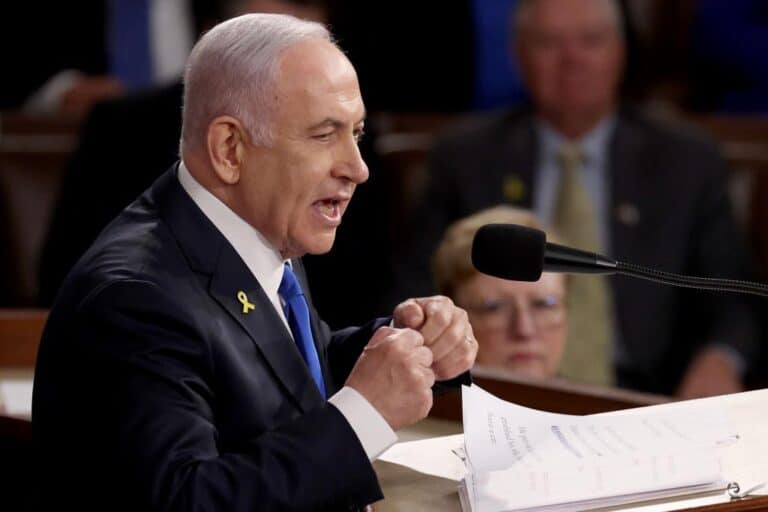
Prime Minister Benjamin Netanyahu addressed the U.S. Congress Wednesday, emphasizing the strength and importance of the alliance between the U.S. and Israel and described his vision for the region after the war.
Here’s what Netanyahu said and why this speech matters at this point in the Israel-Hamas war.
What did Netanyahu say in his speech?
Comparing Oct. 7 to ‘20 9/11s’
Netanyahu began his speech by emphasizing the cruelty of the Oct. 7 massacre, comparing it to horrific attacks in American history like the Sept. 11 terrorist attack on the World Trade Center and the attack on Pearl Harbor in World War II.
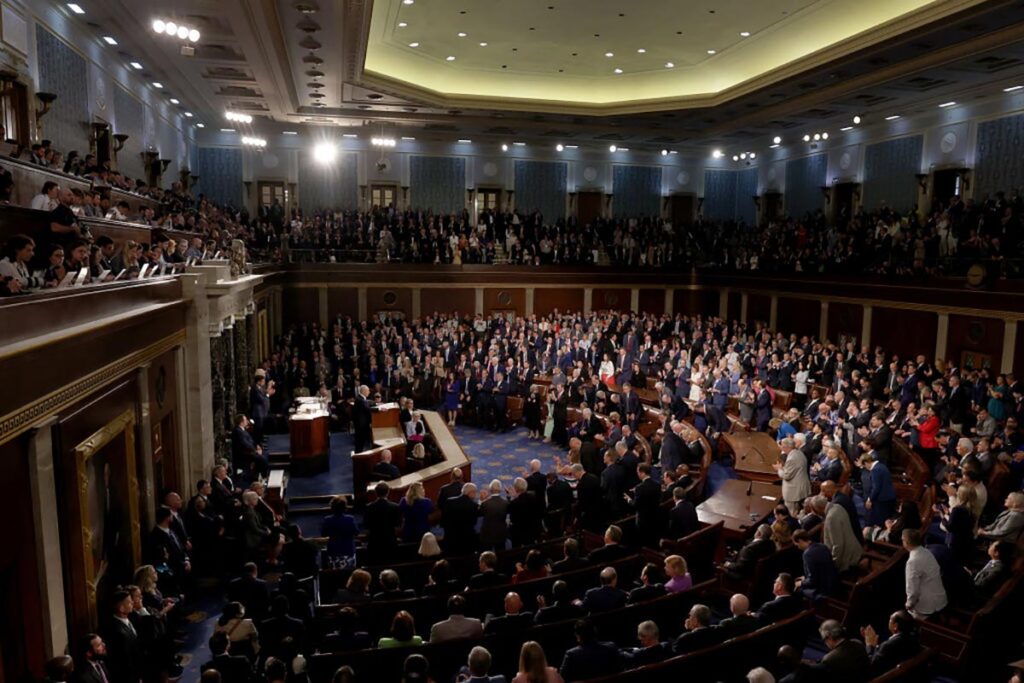
“Like December 7th, 1941 and September 11, 2001, October 7 is a day that will forever live in infamy,” Netanyahu said.
The prime minister described how the day — which was also the Jewish holiday of Shemini Atzeret — started out as a “perfect day, not a cloud in the sky,” but “suddenly, heaven turned into hell.”
Over 1,200 Israelis were murdered by Hamas during the massacre and 250 people were taken hostages. The victims included people from over 40 countries.
“Proportionately, compared to our population size, that’s like 20 9/11s in one day,” stressed Netanyahu.
The plight of the hostages
Netanyahu referenced the plight of over 100 hostages still being held by Hamas in Gaza.
Noa Argamani, who was rescued from Hamas captivity by Israeli forces in a daring operation in June, was present at the speech, sitting next to Netanyahu’s wife, Sara.
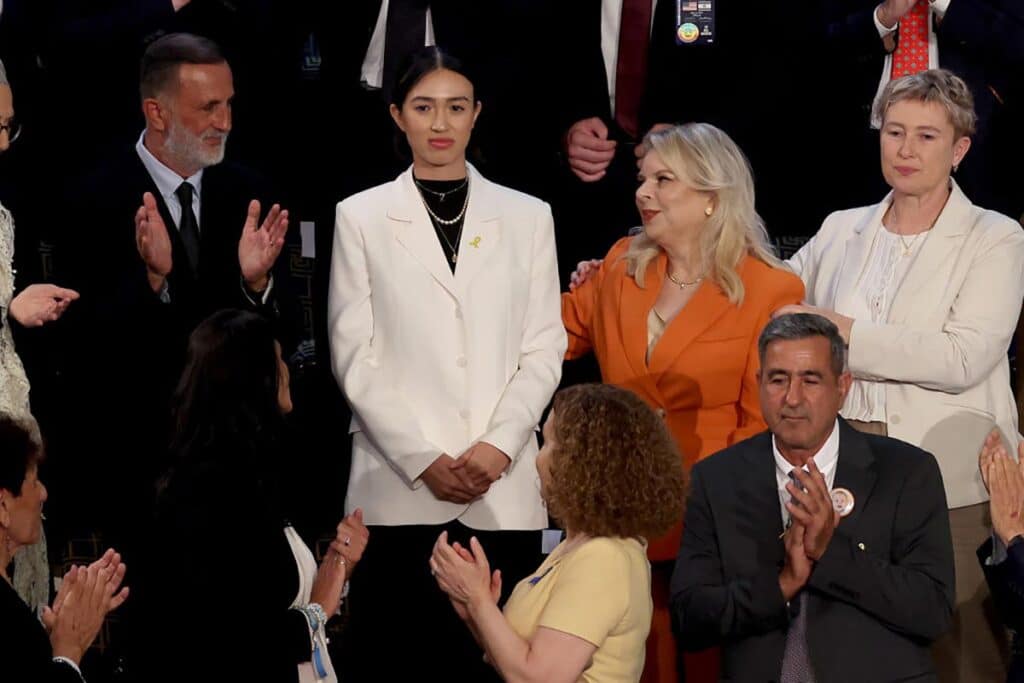
The prime minister described a conversation he had with Argamani’s mother, who recently passed away, describing how she told him that she only had one wish before she died: to hug her daughter one more time. Noa was rescued shortly before her mother’s passing.
Eliyahu Bibas – the grandfather of Kfir, 1, and Ariel Bibas, 4, the youngest hostages being held by Hamas – was present at the address too, as were families of several American citizens still being held hostage. Kfir and Ariel’s parents, Yarden and Shiri, are also still held hostage in Gaza.
The prime minister stressed that some of the efforts to bring the hostages home were happening as he spoke, adding that he would not rest until all the hostages came home.
Shortly after Netanyahu’s speech, Israeli authorities announced that the bodies of five hostages had been retrieved by the IDF and brought back to Israel.
While Israel’s negotiating team was set to depart to take part in talks on Wednesday, their departure was delayed for a few days so that Netanyahu could discuss the negotiations with Biden first. The two met on Thursday.
Netanyahu details his vision for post-war Gaza, Middle East
Netanyahu insisted that Israel does not intend to resettle Gaza, adding that he wants to see Gaza demilitarized and deradicalized after the war.
The prime minister explained that Israel must keep “overriding security control” over Gaza to ensure that there isn’t a resurgence of terrorism. He added that a Palestinian administration that doesn’t seek the destruction of Israel should have control of civilian matters in the Strip.
The comments are likely to spark outrage among some of his political partners, many of whom have called to resettle Gaza and oppose a Palestinian civil administration in the area.
Netanyahu compared the goal to demilitarize and deradicalize Gaza to projects carried out in Germany and Japan by the Allied forces after World War II. He added that “regional partners” could help in doing the same in Gaza and create years of peace and prosperity.
Recently, the United Arab Emirates confirmed that it would be willing to take part in an international peacekeeping force in Gaza to help stabilize and rebuild the Strip after the war. The UAE has insisted, though, that it would only take part if the U.S. led the effort and if the Palestinian Authority agreed to it.
Netanyahu also called for the U.S. and Israel to form a regional alliance that would include countries that have made peace or will make peace with Israel to counter Iran. He pointed to the group of six countries that shot down many of the hundreds of drones and missiles Iran launched toward Israel back in April as an example of how this alliance could look.
Netanyahu suggested that the new alliance could be called the “Abraham Alliance” in reference to the Abraham Accords that established relations between Israel and the UAE, Bahrain, Morocco, and Sudan.
Anti-Israel protesters are ‘Iran’s useful idiots’
Netanyahu spent a significant part of his speech addressing anti-Israel protesters, expressing shock that they “choose to stand with evil” by siding with Hamas.
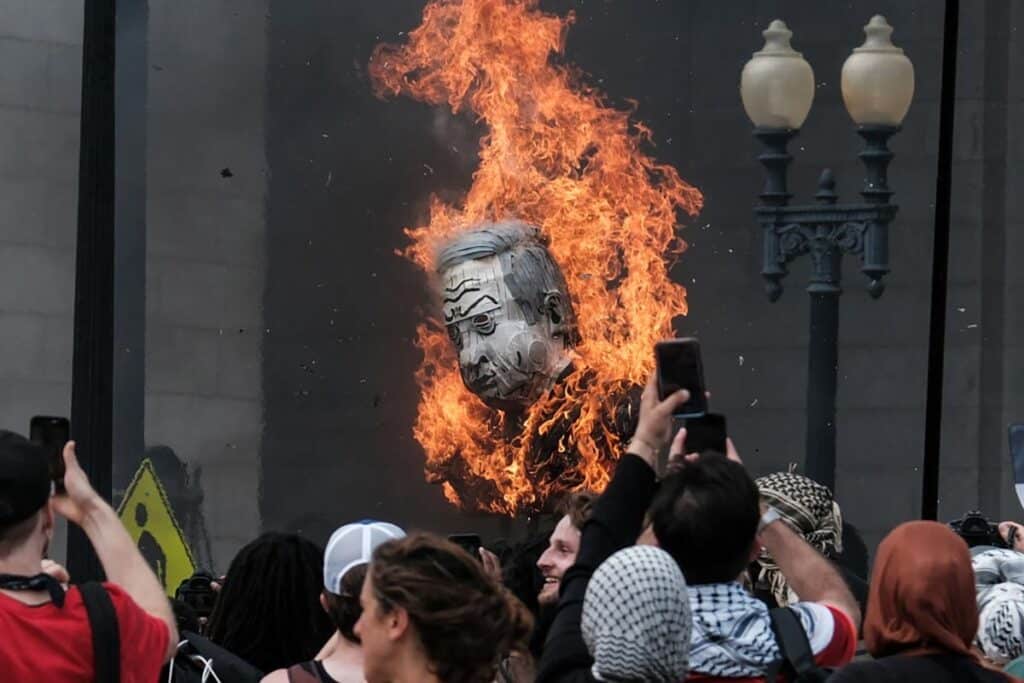
“They should be ashamed with (sic) themselves,” said Netanyahu.
The prime minister pointed to information that Iran is funding some of the anti-Israel protests in the U.S., warning that the Islamic Republic wants to disrupt America.
“I have a message for these protesters. When the tyrants of Tehran, who hang gays from cranes, and murder women for not covering their hair, are praising, promoting, and funding you, you have officially become Iran’s useful idiots.”
Netanyahu ridiculed protesters who held signs reading “gays for Gaza,” saying that “they might as well hold up signs saying ‘chickens for KFC.'”
The prime minister also rejected claims by protesters that Israel is a “colonialist state,” stressing the Jewish people’s history in the land. “For nearly 4,000 years, the Land of Israel has been the homeland of the Jewish people. It’s always been our home, it will always be our home.”
The prime minister compared accusations blaming Israel for the humanitarian crisis in Gaza to blood libels used to justify violence against Jews throughout history.
Netanyahu insisted in his speech that Israel has been letting in plenty of food into Gaza, claiming that Hamas is responsible for any starvation because the terrorist organization steals the aid once it gets into Gaza. He also pointed to the IDF’s efforts to protect civilians during its operations.
“For Israel, every civilian death is a tragedy. For Hamas, it’s a strategy. They actually want Palestinian civilians to die so that Israel will be smeared in the international media and be pressured to end the war before it’s won,” he continued.
Praising Biden and Trump
Netanyahu thanked Biden for his efforts to rescue the hostages and his support for Israel, referencing the president’s solidarity visit to Israel after Oct. 7.
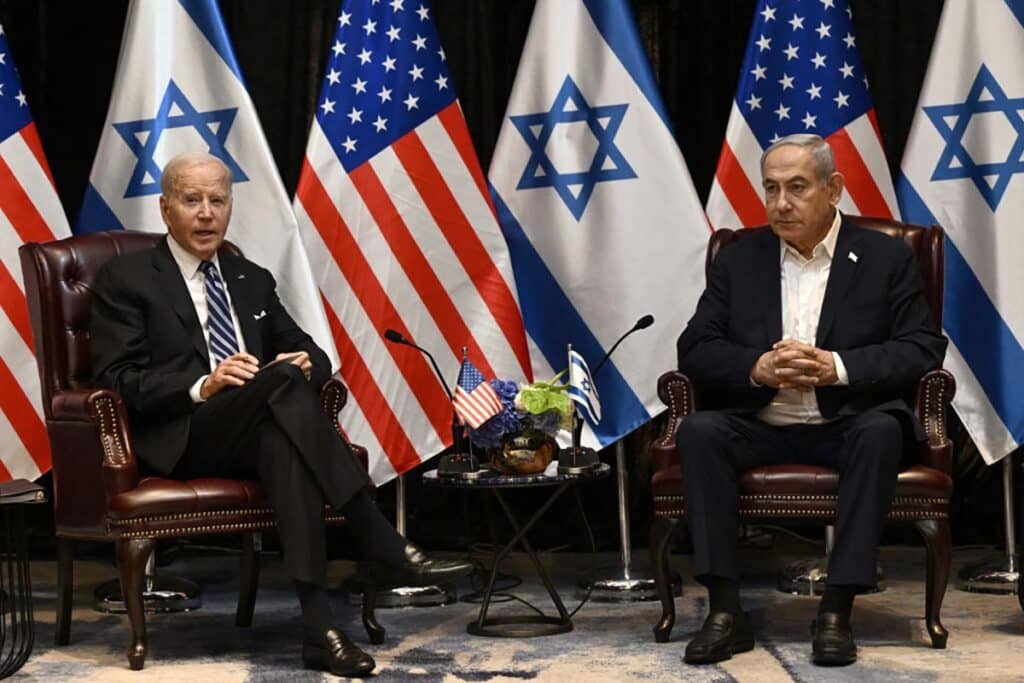
The prime minister thanked Biden for half a century of friendship with Israel and for being a “proud, Irish-American Zionist.”
During the speech, Netanyahu also stressed that Israelis were relieved to hear that former President Trump was safe after the assassination attempt that recently targeted him. Netanyahu added that “there is no room for political violence in democracies.”
Netanyahu also thanked Trump for his role in securing the Abraham Accords during his presidency, as well as for moving the American embassy to Jerusalem and recognizing Israeli sovereignty over the Golan Heights.
While his focus on Trump raised some eyebrows, other politicians dismissed complaints about his mention of the former president. Jewish Rep. Brad Sherman (D-CA) noted that Netanyahu, as a foreign leader, simply needed to be bipartisan when speaking to Congress.
A shared threat between Israel and the U.S.
Netanyahu put a major emphasis on Israel and America’s shared interests, pointing to the threats Iran and its allies make against both Israel and the U.S.
“Iran understands that to truly challenge America, it must first conquer the Middle East,” explained Netanyahu, pointing to Iran’s many proxies across the region. “For Iran, Israel is first, America is next,” Netanyahu said.
The prime minister stressed that when Israel acts against Iran’s nuclear program, it’s not just protecting itself, it’s also protecting the U.S.: “Our enemies are your enemies, our fight is your fight, and our victory will be your victory.”
Netanyahu also pointed to joint U.S.-Israeli projects to develop advanced weapons, military aid from the U.S. to Israel, and intelligence Israel provides to the U.S. to illustrate how strong ties between Israel and America are.
A request for more military aid
Netanyahu took the opportunity to urge the U.S. to provide more military aid to Israel, at a quicker pace, in order to help win the war faster.
The prime minister quoted Winston Churchill’s request for military aid from the U.S. during World War II saying, “Give us the tools, and we’ll finish the job.” Netanyahu recently broke Churchill’s record as the foreign leader to address Congress the most.
Military aid has been a sore topic in recent months after the U.S. delayed a shipment of bombs set for Israel for several weeks due to concerns about the IDF’s operations in Rafah. That shipment has since been delivered.
Why Netanyahu’s speech was important
Netanyahu’s speech came at a turning point, both in the war against Hamas and in U.S. politics.
In the Middle East, hostage negotiations have made significant progress in recent weeks, with Israeli and American officials stating that a hostage and ceasefire deal is closer than it’s ever been.
The deal currently on the table would halt the war for at least six weeks. Hamas would release a number of women, elderly men, and wounded hostages and Israel would withdraw from many areas in Gaza and release hundreds of Palestinian prisoners.
All of the heads of Israel’s security forces recently endorsed the deal, stressing that “it’s time to prioritize releasing the hostages, whose time is limited.“ Many world leaders are pushing to use this deal to end the war completely.
The deal could be extended to secure the release of additional hostages. Of the 250 hostages taken by Hamas on Oct. 7, 111 are still being held in Gaza. At least 39 of the remaining hostages have been confirmed dead by the IDF.
In terms of U.S. politics, President Joe Biden announced Sunday that he was ending his bid for reelection. Biden’s vice president, Kamala Harris, is expected to take his place as the Democratic candidate with just about three months until election day.
Mixed reviews over Netanyahu’s speech in the U.S.
Netanyahu received repeated standing ovations from members of Congress during his address, but not everyone was a fan of the prime minister, nor his remarks.
Sen. Ben Cardin (D-MD), who presided over the speech, said he felt Netanyahu’s address was not partisan and that he appreciated the prime minister’s commitment to normalization in the region and his efforts toward a pathway to peace between Palestinians and Israelis.
Cardin — who is Jewish — did, however, express opposition to Netanyahu generalizing all protesters as pro-Hamas, saying he felt that at least some of the protesters’ motivations are “pure.”
Sen. John Fetterman (D-PA) – who uncharacteristically sported a suit and tie at the event – called the speech “very forceful.”
Other Democrats expressed concerns that Netanyahu was interfering with U.S. politics in his speech and were discouraged that the prime minister did not present a clear plan for ending the war and handling Gaza.
Sen. Chris Murphy (D-CT) said the address “was more a commentary of U.S. politics, rather than a path forward for Israeli and U.S. security,” claiming that Netanyahu was trying to bolster his political standing and Republican messaging.
About 50 Democratic members of Congress boycotted Netanyahu’s speech.
Vice President Harris did not preside over the speech, instead speaking at a college sorority event she had previously scheduled. Harris and Netanyahu met privately Thursday.
Harris stressed that her absence didn’t reflect any change in her position toward Israel, but she still came under fire from both American politicians and Israeli officials who said that this was “not a way to treat an ally.”
Vice presidential nominee Sen. JD Vance (R-OH) was also not present at Netanyahu’s address due to preexisting commitments on the campaign trail.
While the Israeli prime minister was speaking about the need to fight against antisemitism, Palestinian-American Rep. Rashida Tlaib (D-MI) held up a sign reading “war criminal” and “guilty of genocide.”
Former Speaker of the House, Nancy Pelosi, skipped Netanyahu’s speech, calling it “by far the worst presentation of any foreign dignitary invited and honored with the privilege of addressing the Congress of the United States.”
Outside of the Capitol, thousands of anti-Israel protesters chanted and held signs showing their support for Palestinians and Hamas, accusing Israel of committing genocide. Some even burnt American flags during the speech.
Graffiti scrawled in the area read: “Hamas is coming,” “All Zionists are bastards,” and “Long live the resistance,” among other slogans. One protester was photographed holding a sign reading “Allah is gathering all the Zionists for the ‘Final Solution,’” while others were seen waving a Hamas flag.
Hostage families, Israeli politicians continue to condemn the prime minister
Some families of the hostages expressed opposition to Netanyahu’s speech as well, arguing that he should be spending his time working on securing a deal to free their loved ones. Several family members who attended the speech were detained after standing and displaying T-shirts that read “Seal the deal now.”
Eli Elbag, the father of 18-year-old Liri who is still held by Hamas, expressed outrage that Netanyahu didn’t mention a hostage release deal during his speech.
Knesset Opposition Leader Yair Lapid criticized Netanyahu’s speech on Wednesday, questioning, “What about the hostages? What did you say about it besides empty words?”
Lapid added that Netanyahu could have announced that he was accepting a deal and presented a realistic “day-after” plan, but “he didn’t do that.” He also criticized the prime minister for not taking responsibility for the failures that took place on Oct. 7.
“The only commendable thing in the speech was the warm thanks he gave to President Biden, whom he has been defaming for months,” Lapid said. “Besides that, it would’ve been better for all of us had he stayed home and dealt with the hostages in Gaza and the displaced in the north.”
However, some continue to stand with the embattled prime minister.
Finance Minister Bezalel Smotrich lauded Netanyahu’s speech as an “amazing service” for the State of Israel.
“He raised our national honor, brought our simple truth in clear and eloquent language to almost every home in the world, and expressed the central place that the Jewish state occupies in the world,” said Smotrich.
